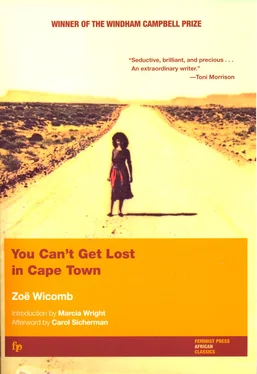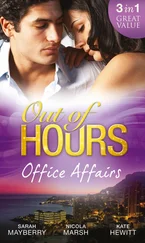Will he today take the opportunity to retract those words? Has he too tired of the hyperboles of love? He will find so many reasons to spit at me.
But that was a very long time ago. Now his contempt will be a grown-up silence. Or his words, in a language I ought to know, will fall on my uncomprehending ears. Or perhaps I, sealed off from the eloquent world around me, will not be worthy of his notice.
I look up and meet myself in his glasses which tell me that I must leave. But my right leg that had been tucked under the left thigh tingles with pins and needles. I rise, wobble, reach out for the wall but find my hand landing in his firm grip.
‘Are you all right?’ he asks in English, and takes off his glasses. An empty gesture since his face retains the anonymity that sunglasses so mercifully bestow. I am still not sure whether he recognises me: my hair is no longer straightened, my clothes are carefully chosen from jumble sales and I have a vegetarian diet to thank for my not altogether unbecoming plumpness. An alternative bourgeois, European style. Perhaps my voice.
‘Yes, it’s just that. ’ but my legs give way as I withdraw my hand. How has he managed to get my own body to rebel against me in this way? He reclaims my hand.
‘You need water,’ and he leads me with the confidence of those acquainted with emergencies to a tap almost hidden by the tarnished orange of tattered cannas.
Someone says, ‘You’d better not. That tap is for the flowers. The old man will let thunder loose on us.’
Upon which a woman with several doekies wrapped around her head produces from under her bundles a gallon can of water.
‘Here,’ she says, ‘I fill my can wherever I go. Our water in Moedverloor is salt enough to shrink the innards. Here, have a drink but don’t splash. As long as there’s no splashing he won’t know a thing.’
The can passes round in an infectious thirst. The woman parts the cannas and just turns the tap on when the starched cap of the servant girl pops over the wall.
‘My God,’ she exclaims indignantly, ‘your mama won’t know you when doctor finishes with you — pulp,’ and she pummels and moulds with her hands an imaginary ball of flesh. The woman listens composedly, with cocked head, but does not stop the tap. ‘There,’ pointing into the distance, ‘across those blue mountains lies my mama, a box of bones under an antheap,’ she says irrelevantly. So that the girl laughs and says, lowering her voice, ‘He’ll be here soon. Just doing the last sick white.’ The green grapes twitch as she drops behind the wall.
I have found a cushion for my dizzy head in the cleft of bougainvillea branches. I stare at the crushed confetti of mauve blossoms at my feet and note for the first time the tiny yellow trumpets in the centre. I do not realise that I look ridiculous until he draws me out of the shrub.
‘You ought to have a walk,’ and he puts his dark glasses back on. Surely he is seeking my death. Exercise seems an unusual remedy for faintness which he thinks I suffer from. But I do not resist. I do not tell this tokolos of a man to piss off. And I find no comfort in the thought of going home to Father and a cup of Rooibos tea.
We stumble along past the butcher’s where the man in the white polystyrene hat packs his parcels of meat into the bicycle basket in readiness for the afternoon delivery. Henry shouts something to him in his language but the man looks puzzled and Henry repeats, enunciating more carefully. Do I imagine his words echoing? The street is so still; only the shopkeepers are left, turning their keys as they retreat from the afternoon heat. The man in the hat smiles and lets loose a volley of grunts and Ewe’s so that I assume the exchange to be purely phatic. Just showing off. But I want him to know where my allegiance lies. Shame and vanity produce the words, ‘You speak Zulu?’ I keep my voice flat, matter-of-fact.
‘No,’ and he waits for the word to take effect before he continues, ‘Xhosa.’ His reply induces faintness, an alternating light- and heavy-headedness. I feel the thrill of an adolescent wish coming to pass. How I hoped that I would sink into a faint and be carried along the corridor by the science teacher whose impatience at my stupidity would melt into solicitude. But I was always big, robust; it is unlikely that I will lose consciousness for even one delicious second.
We walk slowly and in silence. Which I break. ‘Where did you learn?’
‘Karasburg,’ another pause, ‘Namibia,’ as if I would not know.
‘All the way up there?’
‘Yes all the way up there.’ He will not be enticed into explaining. Unless it is simply a lie, since Xhosa is not spoken that far north.
We turn into the Main Road lined with dusty trunks of eucalyptus trees. The remote grey-green foliage has forged ahead into cooler regions way above the single-storey buildings. The still midday rays of the sun become molten globules of metal that fall plop into my thick black hair. My neck bulges under the weight. I reach with my free hand towards the trunk of a tree and he says with a trace of impatience, ‘What’s the matter?’ I have to hold on to his heavy rural ‘metter, metter, metter,’ before I manage to say that I feel faint. He looks up and down the deserted Main Road, quickly, anxiously, and I wonder whether he thinks of Father appearing from around a corner.
He says, ‘I have a friend just a few yards away. You could sit down there and rest.’ I would rather go back to the surgery, but he assumes my assent and leads me down an affluent white residential street. ‘It’s so hot,’ I say apologetically; I am dimly aware of the fact that I do not want to be here. It is clear that he is irritated by me.
We turn into a lane lined with hibiscus blossoms that bellow their well-being from flame-red trumpets, and enter at a side gate. Behind the house, after the beds of dahlias and obedient rows of pink gladioli, we come to a flat-roofed building. Its door faces away from the house, clearly the servant’s room. The occupant, still wearing her white apron, sits on the step, her door ajar. She has kicked off her shoes and the bunion on her right foot looks bruised.
‘Middag,’ she says moodily. He explains hurriedly in Afrikaans that he needs the room, that I, Mr Shenton’s daughter from England, feel faint.
She puts on her shoes and from her apron pocket takes a key which she throws at him. She walks off without a word towards the house.
There is a single bed with a candy-striped cotton cover against the far wall. A door leading into a cramped lavatory stands ajar. He is familiar with this room. He takes a plastic mug from the cupboard, fills it with water and passes it to me. I drink greedily. The bed is soft. My body sinks into it and I drift off to a faint lullaby of rain dripping from a beam. Kitty miaows plantively but darkness falls, and I am drawn into, dwindle, in the dark pupils narrowing to night.
When I come to he is on the floor, hurriedly replacing the spilled contents of his bag. I note a revolver, a map and a hipflask.
‘You were out cold for a couple of minutes,’ he says.
‘What,’ I ask, ‘do you need a revolver for?’
I do not expect a reply, but he answers earnestly, ‘In the bush there’s a war going on that you know nothing of, that no newspaper will tell you about.’
‘I know,’ and I look out at the bougainvillea pressing against the window. He says pleasantly, ‘Surprising that you lose your resistance to the heat so soon. Only ten years you’ve been away, actually eleven in January.’ So he had been checking my movements in those last years when I had neither seen him nor thought about him. He waits in vain for me to betray my surprise before he continues, ‘Tell me about the green and pleasant land.’
Читать дальше












